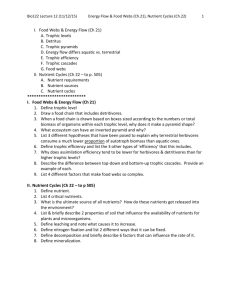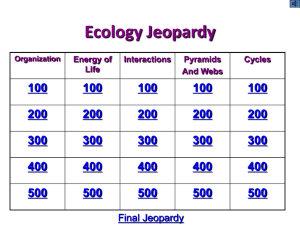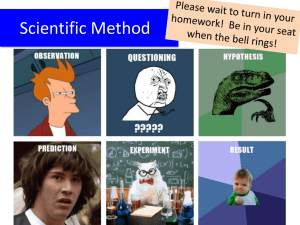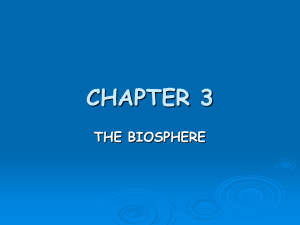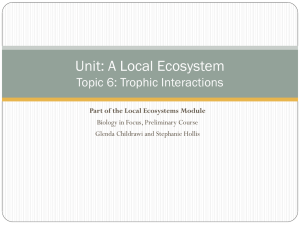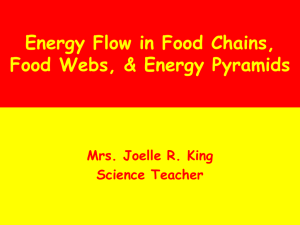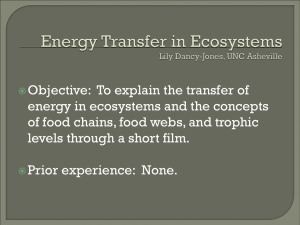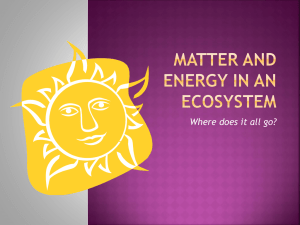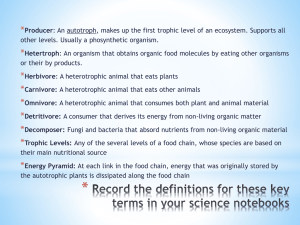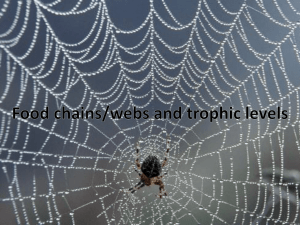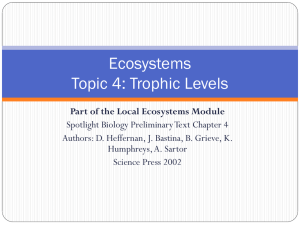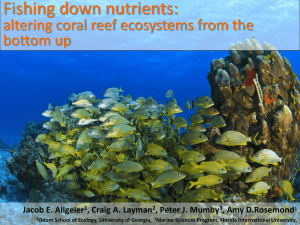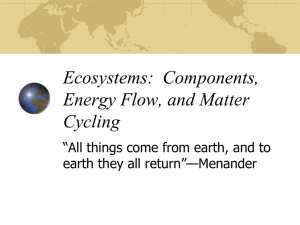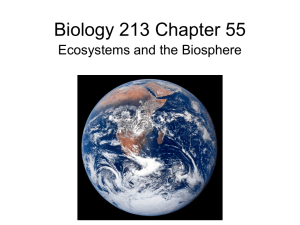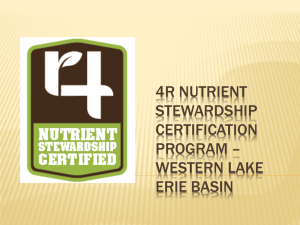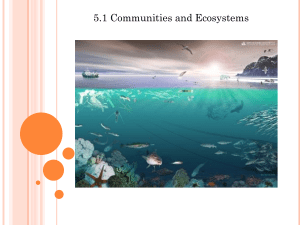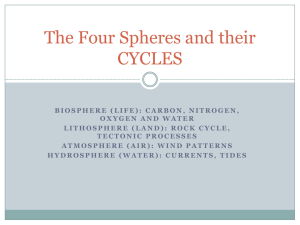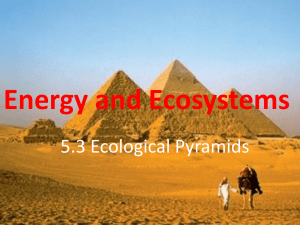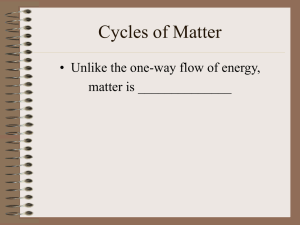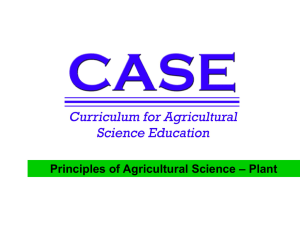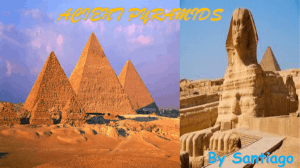Energy Flow in Ecosystems File
advertisement
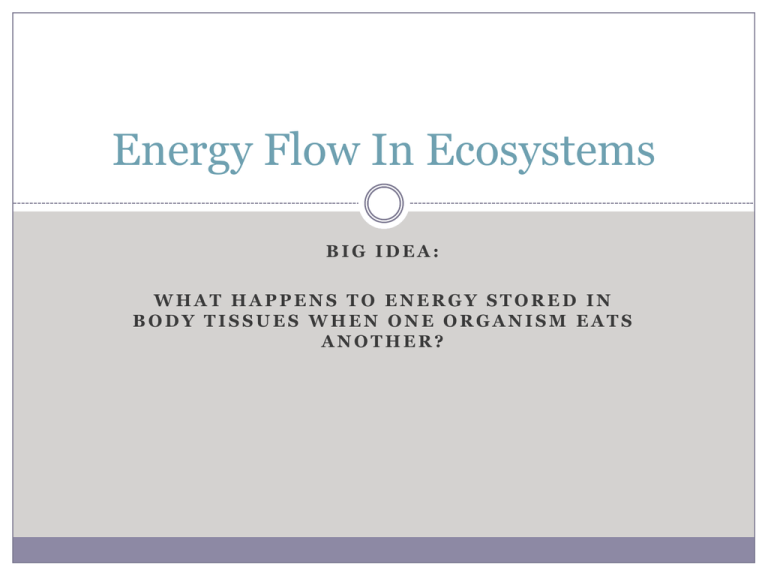
Energy Flow In Ecosystems BIG IDEA: WHAT HAPPENS TO ENERGY STORED IN BODY TISSUES WHEN ONE ORGANISM EATS ANOTHER? Food Chains & Food Webs How does energy flow through ecosystems? A 1-way stream, from primary producers to consumers Food Chains A series of steps in which organisms transfer energy by eating and being eaten Food Chains & Food Webs Food Webs A network of feeding relationships; shows all the feeding relationships within an ecosystem Food Chains & Food Webs Food Webs – Very complicated Notebook Time: Describe the ecosystem that is your backyard Draw a food web of that ecosystem Be as specific as possible Draw a food chain from within your food web What role do decomposers & detritivores play in food webs? Food Chains & Food Webs Disturbances In your groups, answer the following questions using the food web below: What effect would an insecticide have on the food web? Would this have an effect on the populations of non-insect eating animals? What populations would increase? What populations would decrease? Would this change any animals eating habits? Which ones & how? Trophic Levels & Ecological Pyramids Trophic Level Each step in a food chain Ecological Pyramids Show relative amount of energy or matter contained within each trophic level in a given food chain or food web There are 3 different types of Ecological Pyramids Pyramids of Energy Pyramids of Biomass Pyramids of numbers Ecological Pyramids Pyramids of Energy Show relative amounts of energy available at each trophic level Typically 1/10 or 10% of available energy within one trophic level is passed on to the next level In other words: 1/10 of the solar energy captured and stored in leaves of grasses ends up stored in the tissues of cows Ecological Pyramids Pyramid of Biomass & Numbers Biomass – Total amount of living tissue within a given trophic level Pyramid of Biomass Illustrates the relative amount of living organic matter available at each trophic level of an ecosystem Ecological Pyramids Pyramid of Biomass & Numbers Pyramid of Numbers Shows the relative number of individual organisms at each trophic level in an ecosystem Cycles of Matter How does matter move through the biosphere? Biogeochemical cycles Elements pass from one organism to another and among parts of the biosphere in closed loops These loops are powered by the flow of energy. 4 Processes involved with biogeochemical cycles Biological Processes Any and all activities performed by living organisms Geological Processes Volcanic eruptions, erosion, plate tectonics Chemical & Physical Processes Formation of clouds, flow of running water, lightning Human Activity Deforestation, burning of fossil fuels, use of fertilizers Water Cycle Water moves continuously between, oceans, the atmosphere, land and the organisms in them. Transpiration Evaporation of water from leaves of the plants Evaporation Loss of water from surface of bodies of water Condensation When water vapor cools & becomes liquid Precipitation When water falls out of the atmosphere Nutrient Cycles 3 main Nutrient Cycles Carbon Nitrogen Phosphorus Nutrient Cycles Carbon Cycle Found in several large reservoirs in biosphere Atmosphere = CO2 Oceans = Dissolved CO2 Land = in organisms, soil & rocks Underground = Coal, Petroleum & Calcium Carbonate In Life = base of all organic molecules Nutrient Cycles Nitrogen Cycle Required to build proteins, DNA, RNA Atmospheric Nitrogen N2 = Non-usable form for most organisms Needs to be “fixed” Nitrogen Fixation • Process of N2 being converted into ammonia, nitrates & nitrites by bacteria • Relatively small amounts of N2 can be fixed by Lightning Denitrification • When N2 is released by soil bacteria who use nitrates for energy Fertilizer Huge human influence in adding excess Nitrates & Nitrites into aquatic ecosystems Can cause algal blooms Nutrient Cycles Phosphorus Cycle Essential for creation of DNA, RNA Not very abundant in biosphere Remains mostly on land in rock, soil, & sediments As rock & sediments wear down, P is released to environment. Nutrient Cycles Nutrient Limitation Limiting Nutrient In Soil The nutrient whose supply limits productivity Typically Limiting Nutrients are: Ca, Mg, S, Fe, Mn, P, Fixed N, In Ocean Typically Limiting Nutrients are: Fixed N
